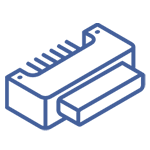

Essentra 36440MF112
Manufacturer No:
36440MF112
Tiny WHSLManufacturer:
Utmel No:
806-36440MF112
Package:
-
Description:
Standoffs & Spacers Male Female Threaded Standoff
Quantity:
Unit Price: $0.480157
Ext Price: $0.48
Delivery:





Payment:











In Stock : 1526
Minimum: 1 Multiples: 1
Qty
Unit Price
Ext Price
1
$0.480157
$0.48
10
$0.452978
$4.53
100
$0.427338
$42.73
500
$0.403149
$201.57
1000
$0.380329
$380.33
Want a lower wholesale price? Please send RFQ, we will respond immediately.
RFQ Now
Add to RFQ list
You may place an order without registering to Utmel.
We strongly suggest you sign in before purchasing as you can track your order in real time.
For your convenience, we accept multiple payment methods in USD, including PayPal, Credit Card, and wire transfer.
RFQ (Request for Quotations)It is recommended to request for quotations to get the latest prices and inventories about the part.
Our sales will reply to your request by email within 24 hours.
1. You'll receive an order information email in your inbox. (Please remember to check the spam folder if you didn't hear from us).
2. Since inventories and prices may fluctuate to some extent, the sales manager is going to reconfirm the order and let you know if there are any updates.
- TypeParameter
- Material
In electronic components, the parameter "Material" refers to the substance or material used in the construction of the component. The choice of material is crucial as it directly impacts the component's performance, durability, and other characteristics. Different materials have varying properties such as conductivity, resistance to heat, corrosion resistance, and mechanical strength, which determine how the component functions in a circuit. Common materials used in electronic components include metals like copper and aluminum, semiconductors like silicon, insulators like ceramics and plastics, and various alloys. Selecting the appropriate material is essential for designing reliable and efficient electronic components.
Nylon - Weight-
- RoHSDetails
- Factory Pack QuantityFactory Pack Quantity1000
- PackageBulk
- Base Product Number
"Base Product Number" (BPN) refers to the fundamental identifier assigned to a component by the manufacturer. This number is used to identify a specific product family or series of components that share common features, characteristics, or functionality. The BPN is usually part of a larger part number or order code that includes additional information, such as variations in packaging, tolerance, voltage ratings, and other specifications.
36440MF - MfrEssentra Components
- Product StatusActive
- Screw, Thread Size#4-40
- Series
In electronic components, the "Series" refers to a group of products that share similar characteristics, designs, or functionalities, often produced by the same manufacturer. These components within a series typically have common specifications but may vary in terms of voltage, power, or packaging to meet different application needs. The series name helps identify and differentiate between various product lines within a manufacturer's catalog.
MicroPlastics - TypeHex
- ColorNatural
- Gender
In the context of electronic components, the parameter "Gender" typically refers to the physical characteristics of connectors or interfaces that determine how they can be mated together. Connectors are often designed with specific gender types, such as male or female, to ensure proper alignment and connection between devices. A male connector typically has protruding pins or plugs that fit into a corresponding female connector, which has receptacles or sockets to receive the pins. This design helps prevent incorrect connections and ensures a secure and reliable electrical connection. Understanding the gender of connectors is crucial when designing or assembling electronic systems to ensure compatibility and proper functionality. It is essential to match the gender of connectors correctly to avoid damage and ensure optimal performance of the electronic components.
Male / Female - Plating
In the context of electronic components, "Plating" refers to a process of depositing a thin layer of metal onto a substrate material. This plating is often used to enhance the component's performance, durability, and conductivity. The plating material can vary depending on the specific requirements of the component, with common choices including gold, silver, tin, and nickel. Plating can also be used for corrosion resistance, solderability, and to improve the overall appearance of the component. Overall, plating plays a crucial role in ensuring the reliability and functionality of electronic components in various applications.
- - Thread Size
given in nominal sizes, not in the actual measurement.
#4-40 - Threaded/Unthreaded
The parameter "Threaded/Unthreaded" in electronic components refers to the type of connection mechanism used for the component. Threaded components have threads on their exterior surface, allowing them to be screwed into place for a secure and stable connection. On the other hand, unthreaded components do not have threads and typically require a different type of connection method, such as soldering or press-fitting.The choice between threaded and unthreaded components depends on the specific application requirements, such as ease of installation, maintenance, and durability. Threaded components are often preferred in applications where frequent disassembly and reassembly are necessary, as they provide a more convenient and reliable connection. Unthreaded components, on the other hand, may be preferred for applications where space constraints or weight considerations are important, as they can offer a more compact and lightweight solution.Overall, understanding the threaded/unthreaded parameter is important for selecting the right electronic components that will best suit the needs of the application in terms of connection method, reliability, and performance.
Threaded - Product
In the context of electronic components, the parameter "Product" typically refers to the specific item or device being discussed or analyzed. It can refer to a physical electronic component such as a resistor, capacitor, transistor, or integrated circuit. The product parameter may also encompass more complex electronic devices like sensors, displays, microcontrollers, or communication modules.Understanding the product parameter is crucial in electronics as it helps identify the characteristics, specifications, and functionality of the component or device in question. This information is essential for selecting the right components for a circuit design, troubleshooting issues, or comparing different products for a particular application. Manufacturers often provide detailed product datasheets that outline key specifications, performance characteristics, and application guidelines to assist engineers and designers in utilizing the component effectively.
Standoffs - Features
In the context of electronic components, the term "Features" typically refers to the specific characteristics or functionalities that a particular component offers. These features can vary depending on the type of component and its intended use. For example, a microcontroller may have features such as built-in memory, analog-to-digital converters, and communication interfaces like UART or SPI.When evaluating electronic components, understanding their features is crucial in determining whether they meet the requirements of a particular project or application. Engineers and designers often look at features such as operating voltage, speed, power consumption, and communication protocols to ensure compatibility and optimal performance.In summary, the "Features" parameter in electronic components describes the unique attributes and capabilities that differentiate one component from another, helping users make informed decisions when selecting components for their electronic designs.
- - Length1.125 in
- Length - Overall
Length - Overall is a crucial parameter in electronic components that refers to the total length of a component from one end to the other. It encompasses any protruding features or attachments, providing a complete measurement of the component's size. This dimension is essential for determining compatibility with circuit boards, housing, and other components in an assembly. Accurate knowledge of the overall length helps ensure proper fit and function in electronic designs.
1.313 (33.34mm) - Diameter - Outside
The parameter "Diameter - Outside" in electronic components refers to the measurement of the outer diameter of a component. This measurement is crucial for determining the physical size and compatibility of the component with other parts or equipment. It is typically specified in millimeters or inches and helps in ensuring proper fit and alignment during assembly or installation. Understanding the "Diameter - Outside" parameter is important for selecting the right components for a specific application and ensuring optimal performance and functionality of the electronic system.
0.250 (6.35mm) 1/4 Hex - Diameter - Inside
The parameter "Diameter - Inside" in electronic components refers to the measurement of the inner diameter of a component, such as a connector, socket, or housing. This measurement is crucial for ensuring proper fit and compatibility with other components or devices. It helps determine the size of the opening or cavity within the component where other parts or components will be inserted or connected. Understanding the "Diameter - Inside" specification is important for selecting the right components for a specific application and ensuring seamless integration within an electronic system.
- - Between Board Height
The parameter "Between Board Height" in electronic components refers to the maximum allowable height between the top surface of the circuit board and the bottom surface of the component that can be mounted on the board. This parameter is crucial for ensuring proper clearance and preventing any interference or short circuits between the component and the board. Manufacturers specify this parameter to ensure that the component fits securely on the board without causing any electrical or mechanical issues. Designers must adhere to this specification during the PCB layout process to guarantee the reliability and functionality of the electronic assembly.
1.125 (28.58mm)























